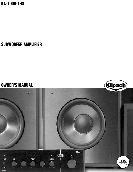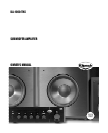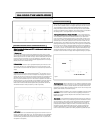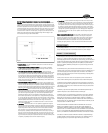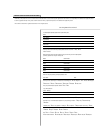
•
Phase Control – In some installations the setting of the Phase control may not make
much difference, whereas in others it may be necessary to go back and forth between
the Phase and Level controls for a while in order to get the very best blend with the
main speakers. Since each control setting (including the one for crossover frequency in
the receiver or processor) affects the optimum settings for the others, it often takes a
while to get everything dialed in just right. Start with the Phase control at 0° and play a
recording with a prominent, repeating bass line in your listening position. Repeat this
process with the control in the 90° and 180° positions. Use the setting that yields the
greatest bass output.
General Comments About Adjustments: Since any change in the setting of one control
tends to change the optimum settings for the others to some degree, the adjustment
process is very interactive and involves a great deal of trial and error. If after a period of
listening and calibration you are still not happy, it may mean that you need to experi-
ment a little with the location of the subwoofer. That, of course, also interacts with
everything else. Again, patience is a virtue. The end result will be well worth the effort.
CARE AND CLEANING
The only thing you should ever need to do to your subwoofer amplifier is to dust it occa-
sionally. Never apply any abrasive or solvent-based cleaner or any harsh detergent.
WARRANTY — U. S. AND CANADA ONLY
The Warranty below is valid only for sales to consumers in the United States or Canada.
KLIPSCH, L.L.C. ("KLIPSCH") warrants this product to be free from defects in materials and
workmanship (subject to the terms set forth below) for a period of five (5) years from the date of
purchase. During the Warranty period, KLIPSCH will repair or replace (at KLIPSCH’s option) this
product or any defective parts (excluding electronics and amplifiers). For products that have
electronics or amplifiers, the Warranty on those parts is for a period of two (2) years from the
date of purchase.
To obtain Warranty serv i c e , please contact the KLIPSCH authorized dealer from which you pur-
chased this product. If your dealer is not equipped to perform the repair of your KLIPSCH product, i t
can be returned, freight paid, to KLIPSCH for repair. Please call KLIPSCH at 1-800-KLIPSCH fo r
i n s t r u c t i o n s . You will need to ship this product in either its original packaging or packaging affo r d-
ing an equal degree of protection.
Proof of purchase in the form of a bill of sale or receipted invoice, which is evidence that this
product is within the Warranty period, must be presented or included to obtain Warranty serv i c e .
This Warranty is invalid if (a) the factory - applied serial number has been altered or removed from
this product or (b) this product was not purchased from a KLIPSCH authorized dealer.You may call
1-800-KLIPSCH to confirm that you have an unaltered serial number and/or you purchased from a
KLIPSCH authorized dealer.
This Warranty is only valid for the original purchaser and will automatically terminate prior to
expiration if this product is sold or otherwise transferred to another party.
This Warranty does not cover cosmetic damage or damage due to misuse, abuse, negligence,
acts of God, accident, commercial use or modification of, or to any part of, the product. This
Warranty does not cover damage due to improper operation, maintenance or installation, or
attempted repair by anyone other than KLIPSCH or a KLIPSCH dealer which is authorized to do
KLIPSCH warranty work. Any unauthorized repairs will void this Warranty. This Warranty does not
cover product sold AS IS or WITH ALL FAULTS.
REPAIRS OR REPLACEMENTS AS PROVIDED UNDER THIS WARRANTY ARE THE EXCLUSIVE
REMEDY OF THE CONSUMER. KLIPSCH SHALL NOT BE LIABLE FOR ANY INCIDENTAL OR
CONSEQUENTIAL DAMAGES FOR BREACH OF ANY EXPRESS OR IMPLIED WARRANTY ON THIS
PRODUCT. EXCEPT TO THE EXTENT PROHIBITED BY LAW, THIS WARRANTY IS EXCLUSIVE AND IN
LIEU OF ALL OTHER EXPRESS AND IMPLIED WARRANTIES WHATSOEVER, INCLUDING BUT NOT
LIMITED TO, THE WARRANTY OF MERCHANTABILITY AND FITNESS FOR A PRACTICAL PURPOSE.
Some states do not allow the exclusion or limitation of incidental or consequential damages
or implied warranties so the above exclusions may not apply to you. This Warranty gives you
specific legal rights, and you may have other rights, which vary from state to state.
Non-THX / Analog Surround Receiver / Processor or Two-Channel Stereo System
Connection – Some analog A/V receivers and processors (without Dolby Digital
®
or DTS
®
capability) have a line-level subwoofer output. Others have left- and right-channel line-level
outputs, as do some stereo receivers and integrated amplifiers. All separate stereo preamps
and surround processors have line-level outputs. If your system is built around one of these,
it will almost always be best to use the KA-1000-THX with the THX switch in the “Off” posi-
tion. This will activate the crossover and level controls. These types of outputs should be
connected to the KA-1000-THX’s line-level inputs. (See Figure 3.) You will need one or two
shielded, high quality interconnect cables of appropriate length with RCA plugs on each
end. Your dealer can help you select suitable cables.
•
Subwoofer Output – Connect the subwoofer output jack to one of the line-level input
jacks on the KA-1000-THX.
•
Preamp Outputs on Receiver or Integrated Amplifier – If your receiver or integrated
amplifier has spare preamplifier outputs for its front left and right channels, connect
these to the line-level inputs on the KA-1000-THX.
•
Pre-out/Main-in Loops on Receiver or Integrated Amplifier – Some receivers and
integrated amplifiers have their preamplifier and power amplifier stages connected exter-
nally via jumpers. If yours has its left and right front channels connected this way, you
can connect the KA-1000-THX to those preamp outputs. You will need a pair of Y-adap-
tors, each with two male RCA plugs and one female RCA jack. Remove the jumpers for
the two channels. For each, plug one leg of a Y-adaptor into the preamp output jack and
another into the main amp input jack. Plug the cables leading to the KA-1000-THX into
the female ends of the Y-adaptors.
•
Separate Preamplifier or Surround Processor – You will need a pair of Y-adaptors, each
with one male RCA plug and two female RCA jacks. Unplug the cables leading from the
front left- and right-channel outputs on the preamp or processor and plug the Y-adaptors
into them. For each channel, plug the cable leading to the power amplifier into one of the
RCA jacks on the Y-adaptor and the cable leading to the KA-1000-THX into the other.
•
Crossover Adjustment – With the THX switch in the “Off” position as suggested for this
type of setup, the crossover control will be activated. Its status LED will be green signify-
ing that this control is active. Set the control to the approximate low-frequency limit of
your main left and right front speakers. If you don’t have their specifications, take an
educated guess based on the size of the speakers. A large speaker will usually work
down to lower frequencies than a small speaker. So for a large floorstanding loudspeak-
er, you might start with the Crossover frequency set all the way down to 40Hz, whereas
for very small satellite speakers you might want to turn it all the way up to 120Hz. Typical
bookshelf speakers would tend to be in the 50Hz to 80Hz range. If the crossover
frequency is set higher than 100Hz, the subwoofer should be in the front of the room
near the front main speakers.
•
Level Control – With the THX switch in the “Off” position as suggested for this type of
setup, the level control will be activated. Its status LED will be green signifying that this
control is active. Play a variety of music recordings containing strong but not overpower-
ing bass. Adjust the KA-1000-THX’s level control until the music sounds consistently
warm and natural. If you have trouble getting enough low bass without the sound
becoming boomy, it probably means the Crossover control is set too high. Try turning it
down a bit at a time until the problem goes away. If the sound is thin until you turn the
subwoofer Level up so much that lower bass is too prominent, start by varying the set-
ting of the Phase or Boundary Gain Compensation controls. If that does not entirely solve
the problem, you probably need to raise the Crossover frequency.
Figure 3













